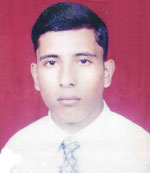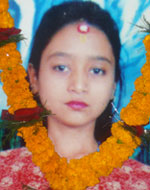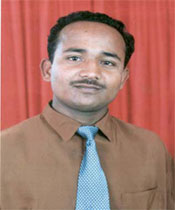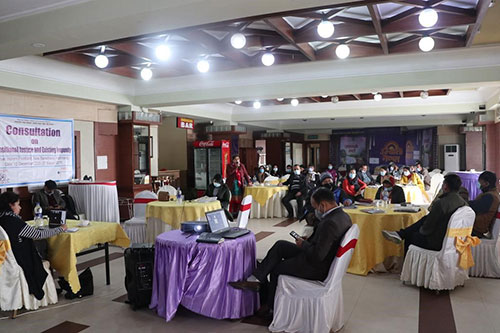Related Links
Case Updates
Krishna Adhikari
 On 6 June 2004, Krishna Prasad Adhikari, a resident of Fujel village of Gorkha District, was murdered in Chitwan District by Maoist cadres. Krishna Prasad was visiting his grandparents after having taken the SLC examinations, and he was abducted from Bakullahar Chowk by men who came on a motorcycle ...
On 6 June 2004, Krishna Prasad Adhikari, a resident of Fujel village of Gorkha District, was murdered in Chitwan District by Maoist cadres. Krishna Prasad was visiting his grandparents after having taken the SLC examinations, and he was abducted from Bakullahar Chowk by men who came on a motorcycle ... Maina Sunuwar
 Around 6 am on February 17, 2004, a group of RNA soldiers arrested Ms
Maina Sunuwar, a 15-year-old schoolgirl of Kharelthok VDC-6, Kavre
district. She disappeared since her arrest. Her family members, with
support from villagers and school where Maina was a student, visited
detention centers ...
Around 6 am on February 17, 2004, a group of RNA soldiers arrested Ms
Maina Sunuwar, a 15-year-old schoolgirl of Kharelthok VDC-6, Kavre
district. She disappeared since her arrest. Her family members, with
support from villagers and school where Maina was a student, visited
detention centers ... Sanjeev Kumar Karna
 Sanjeev Kumar Karna was one among the 11 persons arrested on October 8, 2003. On that fateful day, they had gone to attend a picnic program organized by the students at a place called Kariyachauri VDC-4, and from picnic, they went to Kataiya Chowri Area of Dhanusha district where they ate some food ...
Sanjeev Kumar Karna was one among the 11 persons arrested on October 8, 2003. On that fateful day, they had gone to attend a picnic program organized by the students at a place called Kariyachauri VDC-4, and from picnic, they went to Kataiya Chowri Area of Dhanusha district where they ate some food ... Arjun Bahadur Lama
Arjun Bahadur Lama, 48 years in age, permanent resident of Chhatrebas
VDC -5, Dapcha in Kavre district was abducted by a group of Maoist
cadres, three in number, on 29 April 2005 (2062.1.16 BS) from the
premises of Sri Krishna Secondary School at Chhatrebas VDC-1 of the
district.
» more
Hari Prasad Bolakhe
Hari Prasad Bolakhe, 35 (while missing) a permanent resident of Phulbari VDC-8, Kavre district, a pastor by profession, had been missing since the arrest December 27, 2003, was reportedly killed by security persons. A team of National Human Rights Commission discovered a human skeleton in a jungle ...
» more
Sarala Sapkota
Around 11 p.m. on July 15, 2004, a group of 12 armed soldiers arrested
Sarala Sapkota at her grandfather’s house. The family, who witnessed the
arrest, stated that soldiers gave Sarala no reason for her arrest.
After her arrest, Sarala’s family went to Baireni barracks and the DPO ...
» more
Birendra Shah
On the evening of 5 October 2007, Mr. Birendra Shah, 34, resident of Inruwasira VDC-8, Bara district, a local journalist of Bara district and correspondent of Nepal FM, Avenues Television and Dristi weekly, was abducted by Maoists from Pipara Bazaar in Kalaiya, the district headquarters of Bara ...
» more
Bishwanath Parajuli, Tom Nath Poudel and Dhan Bahadur Tamang
Three persons namely Bishwonath Parajuli (also called Nagendra
Parajuli), Tom Nath Poudel and Dhan Bahadur Tamang of Hasandaha VDC,
Morang were shot dead by the security personnel on 28 September 2004.
According to the eyewitnesses, other victims and the villagers, about 16
people were arrested ...
» more
Chot Nath Ghimire and Shekhar Nath Ghimire
Chot Nath Ghimire, a 58-year-old farmer, resident of Ishaneshor VDC-4,
Ratamate Majhpokhari of Lamjung district was allegedly arrested by the
Joint Security Forces of Joint Security Camp stationed at Bhorlatar VDC,
Lamjung district on February 2, 2002 (2058.10.20). The security camp
called Mr. ...
» more
Bhauna Tharu
Bhauna Tharu (Bhauna Chaudhary in the citizenship card), 21 years old
male (at the time of the incident; Date of Birthe: 8 September 1978),
son of Purna Bahadur Chaudhary, permanent resident of Sujanpur village,
Neulapur VDC-4, Bardiya district, and an employee of Rastriya Gobar Gas,
Gulariya, ...
» more
AF held a Consultation on Transitional Justice and Existing Impunity in Kathmandu

The discussion of the meeting was focused on assessing the current status of transitional justice, 14 years of impunity after the CPA, non-implementation of court orders, NHRC's and UN's recommendations, reflecting on the past approaches of victims groups and civil society, causes of diversion of approaches of victims groups and civil society, need and identification of possible approaches for the collective intervention and devise action plans for such interventions etc.
The meeting concluded on an optimistic note that:
- It is true that victims’ and civil societies have differences in work procedures, but that should not be looked upon as divisions. It is rather a multiplication of the power and contribute to the movement.
- Having more civil societies can be a favor for TJ, as when unified, it can create larger pressure on the Government.
- The only alternative to making the Government accountable is by putting intensified pressure from all levels.
- Mapping is necessary to identify the strengths of each civil society, as some may have expertise in the prosecution and some may have on reparation and so on. Thus, it is necessary to unify all these strengths into a consolidated form and march together.
- Prosecution is not an obstruction to justice, it is also an important aspect of justice.
- There are other stakeholders too who can be incorporated in this journey. It should not be believed that the findings of the meeting are the achievements. Real achievements are when a larger number of stakeholders can be brought together.
- A work plan can be devised to incorporate recommendations provided by the United Nations into Univeral Periodic Review in order to bring the issues of TJ at international level.
- As there are newly appointed officials at the Local Level Government. As a fresh start, they can be encouraged to stand for the rule of law by assisting in bringing past officials who committed the human rights violations during the conflict, into justice.
- Many victims are living abroad where there might be laws in place for their justice and protection. Various diasporas can be used, such as that of universal jurisdiction to bring the perpetrators to justice.
- Vetting can be used as the medium to stop the perpetrators from getting into the Government, being promoted or travelling abroad.
- The recent incident of killing of a school principal in Morang should not be taken lightly. Civil society should bring such issues into the forefront and pressurize the Government to take action against the perpetrators.
- The existing impunity is the result of the impunity of past crimes. Thus to put an end to the impunity, civil societies should unite and make an Action Plan together and put that Action Plan into implementation.
- There should be transparency in the activities of the civil societies, and these activities should direct towards a common goal.
The program was supported by the German Federal Office.
























Join Us